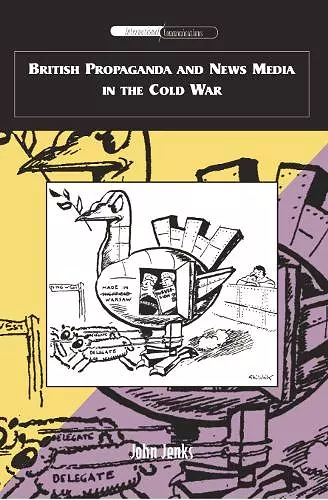British Propaganda and News Media in the Cold War
Format:Hardback
Publisher:Edinburgh University Press
Published:19th Apr '06
Currently unavailable, and unfortunately no date known when it will be back

This is a study of the British state's generation, suppression and manipulation of news to further foreign policy goals during the early Cold War. Bribing editors, blackballing "unreliable" journalists, creating instant media experts through provision of carefully edited "inside information", and exploiting the global media system to plant propaganda -- disguised as news -- around the world: these were all methods used by the British to try to convince the international public of Soviet deceit and criminality and thus gain support for anti-Soviet policies at home and abroad. Britain's shaky international position heightened the importance of propaganda. The Soviets and Americans were investing heavily in propaganda to win the "hearts and minds" of the world and substitute for increasingly unthinkable nuclear war. The British exploited and enhanced their media power and propaganda expertise to keep up with the superpowers and preserve their own global influence at a time when British economic, political and military power was sharply declining. This activity directly influenced domestic media relations, as officials used British media to launder foreign-bound propaganda and to create the desired images of British "public opinion" for foreign audiences. By the early 1950s censorship waned but covert propaganda had become addictive. The endless tension of the Cold War normalized what had previously been abnormal state involvement in the media, and led it to use similar tools against Egyptian nationalists, Irish republicans and British leftists. Much more recently, official manipulation of news about Iraq indicates that a behind-the-scenes examination of state propaganda's earlier days is highly relevant. John Jenks draws heavily on recently declassified archival material for this book, especially files of the Foreign Office's anti-Communist Information Research Department (IRD) propaganda agency, and the papers of key media organisations, journalists, politicians and officials. Readers will therefore gain a greater understanding of the depth of the state's power with the media at a time when concerns about propaganda and media manipulation are once again at the fore.
This book makes a valuable, empirically rich contribution to studies of the media and the state in the United Kingdom. It illustrates the sheer effort put into manipulating editors, journalists, broadcasters, politicians, and academics by the British state after 1945... He demonstrates with skill and conviction just how important setting the agenda was to the British state in this period, and it is a point that has continued significance for understanding relations between the state and the media since 1945. -- Thomas P. O'Malley H-Net John Jenks's excellent monograph shows, with considerable nuance, the extension of the state's projection of British interests and values into peacetime! Jenks's great contribution is the painstaking documentation, in an eloquent and concise telling, of an important story. He makes accessible previously unexamined archival sources (in both Britain and the US) and sets these neatly alongside brief but effective samplings of British postwar media! an important study that will be of great interest to historians of British politics, the Cold War and 20th-century international relations, and to media scholars. -- Mark Hampton, Lingnan University European Journal of Communication Patriotism, imperialism, and structural trends in journalism inform Jenks's compelling application of Gramscian theory to the Cold War's early years. Conditioned to an 'almost reflexive deference to government-defined security concerns' by their second world war experience, patriotic British journalists accepted 'without a murmur' the continuance of the wartime D-Notice Committee and Official Secrets Act. -- Michael E. Chapman Journal of Contemporary History This book makes a valuable, empirically rich contribution to studies of the media and the state in the United Kingdom. It illustrates the sheer effort put into manipulating editors, journalists, broadcasters, politicians, and academics by the British state after 1945... He demonstrates with skill and conviction just how important setting the agenda was to the British state in this period, and it is a point that has continued significance for understanding relations between the state and the media since 1945. John Jenks's excellent monograph shows, with considerable nuance, the extension of the state's projection of British interests and values into peacetime! Jenks's great contribution is the painstaking documentation, in an eloquent and concise telling, of an important story. He makes accessible previously unexamined archival sources (in both Britain and the US) and sets these neatly alongside brief but effective samplings of British postwar media! an important study that will be of great interest to historians of British politics, the Cold War and 20th-century international relations, and to media scholars. Patriotism, imperialism, and structural trends in journalism inform Jenks's compelling application of Gramscian theory to the Cold War's early years. Conditioned to an 'almost reflexive deference to government-defined security concerns' by their second world war experience, patriotic British journalists accepted 'without a murmur' the continuance of the wartime D-Notice Committee and Official Secrets Act.
ISBN: 9780748623143
Dimensions: unknown
Weight: 414g
176 pages